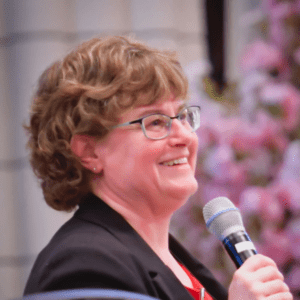When was the last time you purposely shifted your perspective of ministry in order to find new insight and inspiration?
Earlier this year, I found myself at a ministry retreat. It was a strange sort of retreat for me, because while I had been watching and listening to videos about the topic for years, I had never taken part in the actual experience. In fact, my daughters had lent me the materials that I was asked to bring, because I didn’t own any of them. As I looked around at the other participants, it was also clear to me that I only knew one other person in the room, and I had only spoken to that person once before over Zoom. Over the course of the next two days, I—an introvert—would need to make new friends and work closely with these people. So what was this retreat? It was Dungeons and Dragons, a role-playing fantasy game. All of the participants were ministry leaders of one sort or another, and all of us had wondered what it would take for the people around us to move from watching to actively participating, not only in the game at hand, but—more importantly—in the ministry that we all care so deeply about.
Which story would you like to follow?
The Dungeons and Dragons gameplay that we utilized in the retreat was based on the West Marches format, which allows a large group of people to be involved and lends itself particularly well to imagining ways to utilize functions of gameplay in ministry and discipleship development. The game opens with a very rough map of an imagined context that has story hooks connected to various areas such as “there is a rumor of bandits in this area that are making the roads dangerous” or “a pair of explorers went into the mountains seeking a cure for a disease, but they haven’t returned.” The large group of players then take time to ask themselves which story they would like to follow, find fellow journeyers to travel with, and organize themselves into mission parties to take that trip by sharing their unique identities and gifts. It quickly becomes clear that most mission parties experience more success if they have a mix of gifts—fighters, healers, inventors, and scholars. Some parties find they don’t have the right mix of people or resources after the first encounter, so they return to home base, recruit new or additional party members, change out resources and go back out.
As participants in this ministry retreat, we found it intriguing to think about ministry like this game setup. For instance, community ministry begins with a context that could easily be expressed in a real map containing real story questions. Where are we located? Who is around us? What is God already doing? By asking people to be curious about the locations that they already inhabit, they are able to bring back the story hooks that they discover such as “many children at the school need access to food during the school week and over breaks” or “the senior center in the neighborhood doesn’t have enough people to provide a safe space for our elders.”
Change how people react with an invitation
Discovering their own story hook instead of engaging a volunteer sign-up changes how people interact with the invitation. Rather than asking for people to volunteer if they have free time, the ministry leader can ask who might be interested and have the resources, skills or knowledge to engage this dilemma, help the interested parties meet one another, and encourage them to make their own plan of engagement. This engages the unique gifts of each person and calls them into mission rather than asking for spare time, energy or money. The theological leader works alongside the team much as Jesus worked alongside the disciples, describing who God is, how God acts, and claiming God’s love and hopes for the individual as well as the world. The pastoral presence becomes more like a coach than a project manager, helping people find their location in the map, preparing the team for their work, sending them out, and gathering them back in for a debrief.
This simple shift has the potential to introduce and practice key discipleship skills in a way that isn’t possible in a Sunday morning worship service. People are invited to explore places they already inhabit in their daily lives in order to learn more about the people around them, gaining understanding about the context that may often be invisible. Through conversations of giftedness in the mission party, people discern how God might be calling their particular gifts and presence into action, as well as a new appreciation or understanding of the gifts of others. In today’s digital world, the opportunities to practice meaningful conversation, exploration of self identity, participation in a mission larger than the individual, and the realization of the possibilities brought to life when working as a team are incredibly important, especially to those people who are searching for meaning in life rather than association with a church. Indeed, part of the theological understanding of this format is trusting that God will provide the people and resources needed to do the ministry that God is calling your community to do, rather than creating artificial boundaries of task force team terms and the use of gifts within institutional walls.
Many of us have been engaging our ministry settings in the same way for decades. Stepping into a new space gave me a new perspective on possibilities in the congregations I’m connected with, and gave me the opportunity to think more creatively about what God might be doing in this disruptive time of ministry. How are you finding new ways to experience God’s call in your life?
This blog post is an excerpt of an article being published in Word & World, Issue 43-3, Summer 2023. I want to expressly thank Rory Philstrom (The Dungeon Master Pastor found at https://dungeonmasterpastor.com/about/) and Derek White (The Geek Preacher) for their conversations during the retreat. Along with many other participants, they helped me to flesh out and experience how theologies, gaming techniques, and church life might interact and support discipleship.






These are such great connections, Dawn. Thank you for this!! I especially want to life up this part:
” In today’s digital world, the opportunities to practice meaningful conversation, exploration of self identity, participation in a mission larger than the individual, and the realization of the possibilities brought to life when working as a team are incredibly important, especially to those people who are searching for meaning in life rather than association with a church”